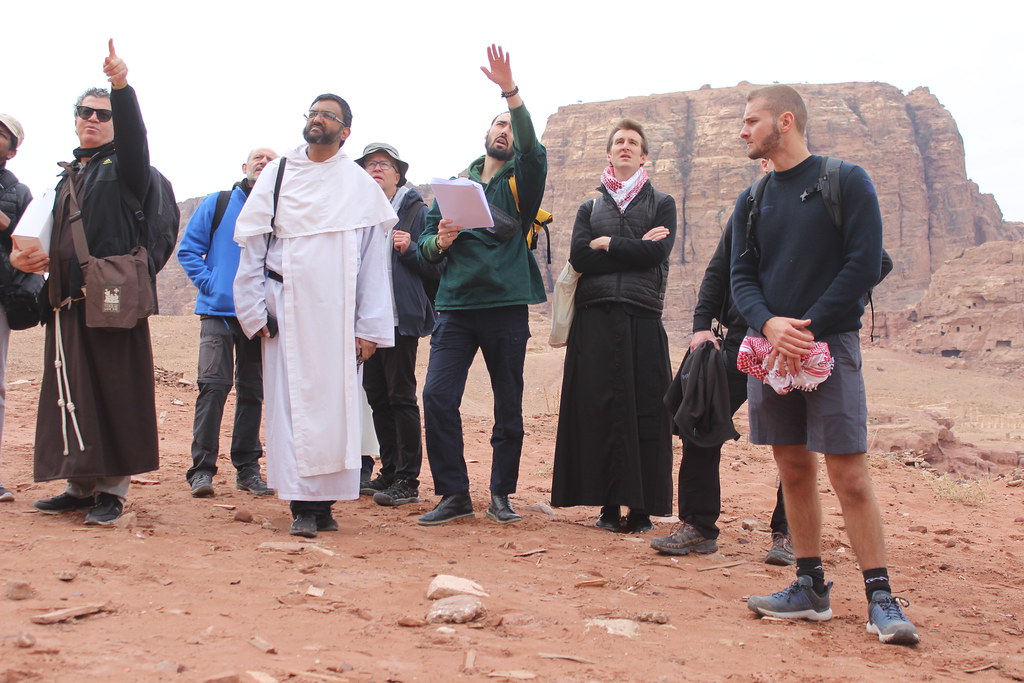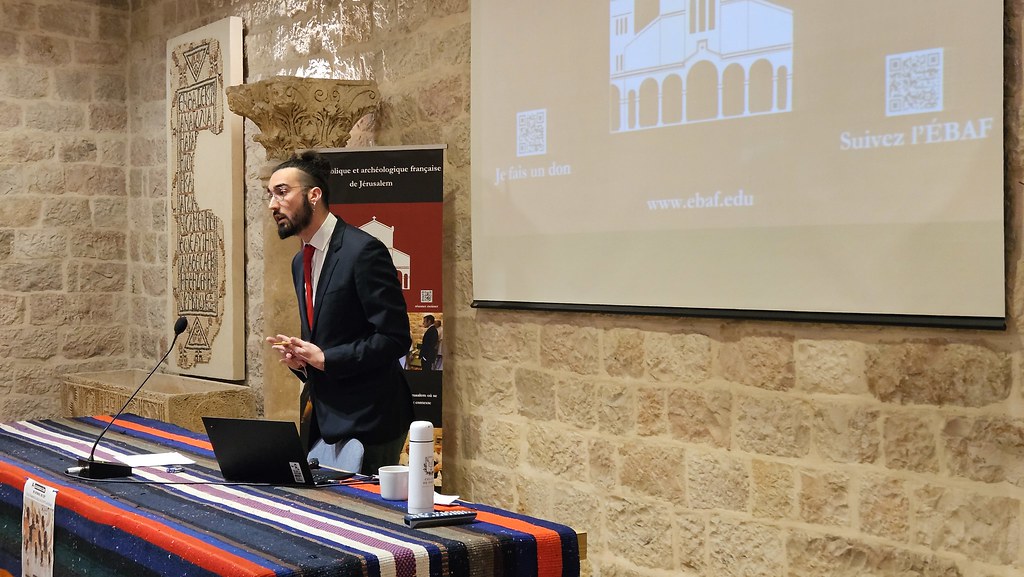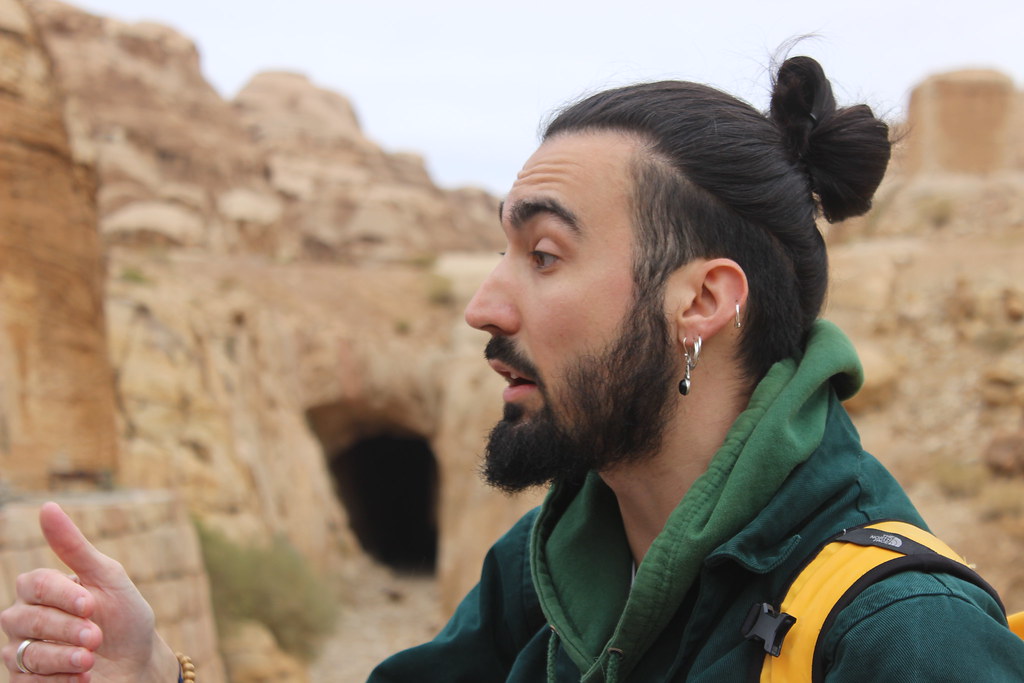Could you please (re)introduce yourself?
My name is Arthur, and I am currently a PhD candidate in Egyptology at the Sorbonne. Prior to this, I spent six years at the École Normale Supérieure (ENS) in Paris, where I studied Classical Literature, specializing first in Indo-European linguistics and later in Semitic linguistics. During this time, I also completed a Master’s degree in Egyptology at the Sorbonne. For four years, I held a teaching position at the Sorbonne, which I combined with work as an archivist at the Egyptology library of the Collège de France (Institut des Civilisations). Seeking a dedicated environment in which to complete the final year of my dissertation, I applied—following the agrégation in Classical Letters—for a one-year research residency at the École Biblique et Archéologique Française (ÉBAF) in Jerusalem. This project is supported by a research grant from the Académie des Inscriptions et Belles-Lettres (AIBL).
Why the ÉBAF for the end of your thesis?
I had already spent four months at the École in 2020, working as an assistant for the research program The Bible in Its Traditions. Those were four of the most intense and intellectually stimulating months of my academic journey. The living conditions at the ÉBAF offer a rare opportunity to devote oneself entirely to study and research. I retained a very positive memory of that first stay, marked by a kind of intellectual effervescence—not only due to the number of books I read in the library, but also thanks to the inspiring encounters with professors, whose courses I was unfortunately unable to follow to the end because of the COVID pandemic. I also fondly remember the high-level intellectual conversations that took place at meals or in daily life, with fellow residents—teachers and researchers—who form the vibrant academic community of the École.
Quel est ton projet académique ?
This time, my primary goal was to complete my dissertation. Over the past four years, I’ve developed a deep passion for academic research. Despite the limited number of academic positions compared to the growing number of PhD and postdoctoral researchers, I hope to prove myself by pursuing one or more postdoctoral fellowships, likely abroad. This year at the ÉBAF has been quite different from my previous stay as an assistant with the Bible in Its Traditions (BEST) program. Back then, my daily routine was structured by Fr. Olivier-Thomas Venard, OP; once I had completed my assigned tasks, I attended lectures. Returning to the École after four years and reconnecting with familiar faces, joining in the communal prayers, and sharing meals as part of daily life was a comforting and grounding experience.
 Photo: ÉBAF, Ordo Prædicatorum. Study trip in Petra, Jordan.
Photo: ÉBAF, Ordo Prædicatorum. Study trip in Petra, Jordan.
Quelles sont les forces de l’ÉBAF selon toi ?
I truly enjoyed returning to the library, which is exceptionally well stocked. Back when I was assisting with the BEST program, I had only just submitted my dissertation project and my academic interests were quite different—I was focused on Biblical studies and the ancient Near East. This time, I was pleasantly surprised to discover how much the Egyptology section of the library had expanded. Few libraries offer such a wide range of resources covering all areas of Antiquity. The efforts of Fr. Pawel Trzopek, OP, followed by Fr. Bernard Ntamak-Songué, OP, deserve particular recognition. Deeply focused on the library, I engaged less with other areas of the École’s academic life, with the exception of Fr. Émile Puech’s workshop on epigraphy and palaeography—a truly fascinating setting where the course on Semitic palaeography is held.
How do you articule faith and reason in this context?
With the exception of my time at the ENS, and my work at the Collège de France and the Sorbonne, I have spent more time studying in environments where faith and scholarship are intertwined than in strictly secular ones. As a result, I’ve grown—as both a person and a Christian—into someone who sees study and faith as deeply connected. In secular settings, it can be more difficult to maintain one’s spiritual practice; it takes greater willpower, and more frequent recourse to God, to preserve that dual life, which can often feel compartmentalized. Here, by contrast, there is no conflict between study and faith. Each is free to flourish without competing with the other, and they nourish one another. It is both enriching and uplifting—on a human and spiritual level—to be able to reconcile the two without feeling torn. My study of ancient languages is, in part, motivated by a desire to better understand biblical texts. Of course, a rock-solid faith doesn’t require such linguistic knowledge, but my background in Latin, Greek, and now Hebrew and Aramaic gives me a deeper access to the biblical texts and their cultural contexts. As is often emphasized at the ÉBAF, there is a real connection between the monument and the document—texts don’t emerge from a vacuum. Their context is Judean and Israelite, but also Canaanite, Near Eastern, and Egyptian, since Egypt ruled over the Levant for a long period. The Bible bears the imprint of these regions and their rulers, and part of it was even written during the Babylonian exile. In my own work, I often encounter echoes of biblical themes in the texts I study. For instance, one of the Egyptian love songs I analyze in my dissertation contains motifs that closely resemble those found in the Song of Songs—suggesting a kind of cultural transfer in the portrayal of romantic love between lovers. This challenges the notion that tracing the Bible’s origins somehow distances us from faith. Quite the opposite, in fact.
What does Holy Land mean to you?
This land is holy in the sense that it is a land of Judeo-Christian election. Its holiness does not reside inherently in the soil itself, but in the fact that God chose to reveal Himself here—first to a people, and then to all of humanity by becoming incarnate. It is also a land of election for Muslims: according to tradition, the Prophet is said to have made a night journey to Jerusalem. In these religious traditions, God chose this land as the starting point of His revelation to humankind. To (re)turn to this origin is also to attempt to retrace its history: first, the story of a people’s relationship with God, and then the relationship of humanity with God through His Son—God made man—who chose to take on flesh here, two thousand years ago.
 Photo: ÉBAF, Ordo Prædicatorum. Jeudi de l’ÉBAF of Arthur, available on our YouTube channel.
Photo: ÉBAF, Ordo Prædicatorum. Jeudi de l’ÉBAF of Arthur, available on our YouTube channel.
Have your stays here changed that perspective?
Absolutely. When I left Jerusalem in 2020, I had the deep conviction that it would remain etched in my memory forever. What has truly changed my perspective is that, honestly, I was not particularly receptive to the notion of holy places. I had already visited Rome, Assisi, and several other pilgrimage sites, but they didn’t move me much. Yet here in Jerusalem, the holiness of the places takes on its full meaning for me: Jesus walked here, lived here, gave His life here, and—above all—rose from the dead here. During my first visit to the Holy Sepulchre, something happened within me—a shift. I suddenly understood what a holy place truly is, and what that definition implies. For me, only in the Holy Land does my relationship to sacred places feel truly different.
What would you say to someone considering studying at the ÉBAF?
I would both encourage them and offer a word of caution. The ÉBAF offers a particular way of life—one that fosters a certain form of asceticism. You don’t come to the ÉBAF to go out every night or to maintain the same kind of social life you might have back home. You come here to refocus on both an academic and a personal goal—to undertake a kind of double retreat: not only a spiritual one—living to the rhythm of the convent bells, with the possibility of attending daily offices—but also an intellectual one. You come to deepen your knowledge, to get the most out of rigorous courses and the rich resources of the library, and to engage in meaningful exchanges with members of the academic community. I would say this year feels like a moment suspended in time—one that holds deep spiritual and intellectual significance. It’s a unique opportunity, not to be squandered. The day-to-day life of a researcher is usually full of meetings, events, and discussions—which is valuable. But rarely do we get the chance to step back and nourish ourselves intellectually in such an intense, almost voracious way. Since arriving, I’ve read more than I have in the last four years of my PhD—no offense to those years! Here, you experience a life of the mind that is both solitary, in the library, and deeply connected, through conversations and the many activities organized by the ÉBAF—like topographical outings and Thursday lectures. You need to know what to expect in terms of the ascetic dimension of this year, but at the same time, it’s an unmissable opportunity—one that should be seized without hesitation.
What would you say to potential donors?
In a world where pure research—the kind pursued for the sake of deepening our understanding of the world, of past civilizations, and of the human experience—is increasingly undervalued and underrecognized, it is more important than ever to defend and support such endeavors. That is exactly what you can do by supporting the ÉBAF. And if there is one place where financial support is truly well invested—beyond humanitarian and charitable causes—it is here, in research. Every donation directly contributes to the creation of something good, in the most literal and etymological sense of the word: a benefit.
Read original in French.

